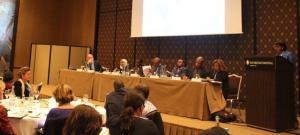Dr Moeti urges intensified actions to address heart diseases in children
The World Health Organization’s Regional Director for Africa, Dr Matshidiso Moeti has underscored the importance of strengthening health services to tackle rheumatic heart disease (RHD), a neglected and preventable disease in children. She made the remarks whilst addressing participants at a seminar on Rheumatic Heart Disease in Adolescents organized by the World Heart Federation on the sidelines of the World Health Assembly in Geneva.
RHD caused by rheumatic fever, is the most common acquired heart disease in children in many countries of the world, especially in developing countries. It is estimated that at least 15.6 million people are currently affected by RHD with a significant number of them requiring repeated hospitalization and, often unaffordable, heart surgery in some years later.
The Regional Director noted that the prevention and control of noncommunicable diseases (NCDs) features prominently in her priorities and RHD is a major public health problem that warrants urgent attention. She said the basic tool for addressing NCDs is WHO’s package of essential Noncommunicable diseases intervention (WHO PEN) which has been developed to strengthen the capacity of frontline health workers to detect and manage major NCDs early.
“The inclusion of RHD management in the WHO PEN protocols is a valuable opportunity to integrate this often forgotten NCD into primary health care delivery systems”, she said.
Dr Moeti welcomed the recommendations of the expert group on RHD convened by the World Heart Federation, the Pan African Society of Cardiology, and the African Union Commission and pledged WHO's commitment to support countries in the establishment of RHD surveillance systems and the integration of primary, secondary, and tertiary RHD interventions into health care services.
_______________________________
For more information, please contact:
Mr Collins Boakye-Agyemang; Tel: + 472 413 9420; Email: boakyeagyemangc [at] who.int (boakyeagyemangc[at]who[dot]int)




